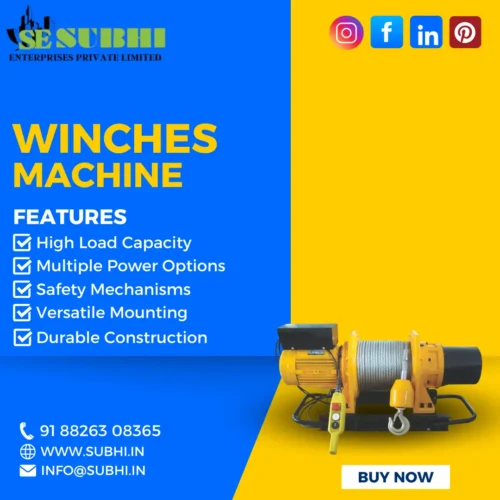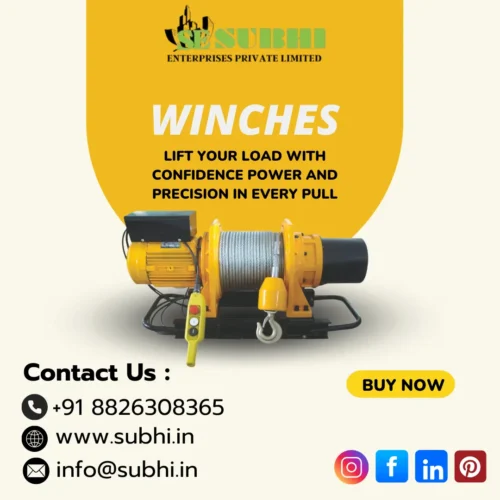Machines such as winches are pivotal in the construction, industrial, marine, and off-road fields. Winches serve to provide power as well as control required to lift, pull or tow heavy loads. This ensures that all tasks are accomplished with proficiency. This article seeks to cover every aspect of the winch machines, their types, applications, benefits and maintenance.
What is a Winch Machine?
A device that consists of a winch belt or rope coiled around a drum is termed as a winch machine. It helps to lift and pull heavy items. Usually, it has a drum, motor, gear system and a brake system. Depending on the type of industry, this equipment can be manual, electric, hydraulic, or pneumatic to best suit the different industrial applications.
Types of Winch Machines
Based on their power source and intended application, winches are classified into different categories. Among the most common are the following:
- Manual Winches
These are simple machines that do not have any electrical components owing to them being hand powered. Manual winches are useful when working on boat trailers, recovery of off road vehicles, and small scale constructions.
- Electric Winches
Electric winches are operated using electric from a vehicle’s battery or an outside power source. They are most popular for vehicle towing, construction cranes, and other industrial applications. Electric winches are easy to operate with a push-button control which makes them great for any industrial setting, plus they can easily lift heavy equipment.
- Hydraulic Winches
Hydraulic winches utilize hydraulic fluid’s pressure to pull. These devices are used widely in marine, construction, and heavy industrial and are certainly more powerful than electric winches. Electric winches are great for overheating, but these multifunctional machines can work nonstop with no overheating issues whatsoever.
- Pneumatic Winches
Pneumatic winches work with compressed air, making them excellent to use in hazardous locations where electric or hydraulic winches are a safety risk. These types of winches are utilized in mining, oil rigs, and chemical plants due to their ability to endure highly dangerous environments without the risk of explosion.
- Industrial Winches
Industrial winches are rugged machines meant for demanding tasks like building bridges, ships, or operating factories. These winches are strong and overload tolerant, which enables them to work with the almost accuracy under vast amounts of pressure
- Capstan Winches
Capstan winches are primarily used in marine services and construction for horizontal pulling. They are different from conventional winches because the rope or cable is not stored on a drum, allowing for long-distance pulling.

Applications of Winch Machines
- Construction Industry
Construction sites are used this machine for the lifting and shifting of heavy materials, machines, and even structural frames. This use minimizes the amount of manual labor required thereby improving the productivity of the project.
- Automotive and Off-Road Recovery
Recreational All Terrain Vehicles, such as Jeeps and ATVs, utilize winches for self-recovery that aids them while stuck in mud, sand, or snow. Trucks, too, have winches for lifting wrecked or parked vehicles onto their backs.
- Marine and Shipping
Mooring, anchoring, and lifting of cargo in the marine industry would be more difficult without winches. Ships, docks, and ports have winches to perform various heavy operations.
- Mining and Oil Rigs
In the mining and oil extraction industry, winches are used to pull equipment, build materials and safely manage considerable weight.
- Forestry and Agriculture
The utilization of winches in agricultural work makes it easier to pull tree stumps and logs. Moving heavy farming machinery and equipment is also made easier with winches.
- Event Rigging and Staging
During theater performances and concerts, winches are used to accurately position and raise stage props, lights, and backdrops.
Benefits of Using Winch Machines
Almost every industry stands to benefit from the use of a winch machine. Here are some reasons why:
- Increased Efficiency
Winches come with high-powered motors that make it much easier to move and lift heavy equipment, which improves productivity.
- Enhanced Safety
Injuries and accidents in the workplace are reduced with the use of a winch as it is designed to prevent uncontrolled lifting or lowering. Most winches come with safety features like automatic brakes and overload protection.
- Versatility
For the small tows projects, there will always be a winch that has the right size and capacity, something that many industries appreciate.
- Durability and Longevity
Best exemplified in heavy duty winches. Due to their nature, these machines are designed to operate under extreme wear and tear, and the user will definitely get their value when looking at it from a long term prospective.
- Cost-Effectiveness
Improper use of winches can financially burden any organization. However, as productivity increases coupled with dwindling labor expenses, the initial investment becomes profitable.

Considerations in the Selection of a Suitable Winch Machine
The selection of a winch is determined by a number of relevant factors.
- Load Capacity
A calculation should be made on the maximum weight that a winch is able to carry. A winch with an average working load limit higher than actual load will always be safer and more efficient.
- Power Source
Decide if manual, electric or hydraulic winch is appropriate for your application. Electric winches are user friendly, but hydraulic winches can powerfully operate for longer periods.
- Cable Type and Length
Winches cables made by steel or synthetic ropes. Steel cables tend to be much more tough, while synthetic ropes are lightweight and much easier to handle.
- Control Mechanism
Certain winches are designed for better and easier control like remote-controlled winches which are very useful in dangerous environments.
- Mounting Options
Make sure that the winch can be firmly mounted onto your vehicle, building structure or equipment to allow for effective performance.
Precautions for the Care and Maintenance of Winch Machine
Planning maintenance helps improve performance and efficiency. The same applies to winches, which must also be properly taken care of.
- General Overhauling
The winch, cable and mounting bolts/points should be inspected for corrosion, damage or wear and tear and repaired if necessary before each use.
- Greasing
Parts that perform a lot of motion require lubrication to prevent frictional wear and reduce the chances of use and tear.
- Appropriate Preservation
When the winch is not in use, it should be stored in a well ventilated place to keep it away from dust, moisture, and extreme temperatures.
- Inspection of the Cable and Rope
Allocating time slots at regular intervals to clean the area surrounding the winch and checking for frayed cables, damage that may have been sustained, or any kinks. Cables and ropes must be replaced when needed to avoid any mishaps.
- Braking System Testing
Check that the systems brakes you confirms that a lift slip of a load drop and other uncontrolled situations are manageable.
- Instructions
To maximize safety, ensure that all installation, operation and maintenance procedures are carried out as per the manufacturer’s guidelines.
Final Thoughts
In the contemporary era of rapid industrial expansion, winch machines designed for the efficient pulling of exceedingly heavy loads are turning out to be indispensable equipment. Different industries have varying requirements with respect to the type of winch needed based on application, power source, and weight the winch will have to pull. Thorough maintenance of the winch will ensure optimal functioning for years, making it a very wise investment fo both individuals and companies. (click )
Get in touch with us today to find out more about our amazing offers as well as expert advice on the finest winches for your construction, industrial, or off-road applications. WInch machines are highly in demand are Subhi Enterprises.
